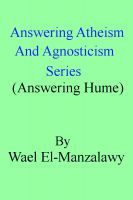
This book is an attempt to criticize Hume's opinions about religion. You can read the following topics: Monotheism And Polytheism, The Necessity Of The Creator, Corruption Of Christianity And Judaism, Man Between Misery And Happiness, Good And Evil ........and others.
Genre: PHILOSOPHY / CriticismEpicurus’s Old Questions
In Hume’s book:”Dialogues Concerning Natural Religion”, Philo says:
“EPICURUS's old questions are yet unanswered. Is he willing to prevent evil, but not able? then is he impotent. Is he able, but not willing? then is he malevolent. Is he both able and willing? whence then is evil?”
Answer:
The answer of Islam is clear from many centuries:
The God has two wills:
1-The Universal Pre-Ordained Will
2-The Religious Legislated Will
According to the God’s Religious Legislated Will, He doesn’t want evil to exist. So He isn’t malevolent. And according to the God’s Universal Pre-Ordained Will, all that happens –good and evil- exits by His Will. So, He isn’t impotent.
Many western readers –who are not familiar with Islamic writings- may not understand this argument. I invite them to read this example:
Mr. Henry is an English teacher. He will test his students. He is a benevolent man. He wants all his students to succeed. But he has to take the following decision:
1-A standard exam will lead to the failure of some students.
2-Too easy exam will lead to the success of all students. But it will be a pseudo success.
He decides to choose the standard test. Is he benevolent? Is his test unjust one?
The God is just. He created men and He knew that some of them will be bad men. By His Religious Legislated Will, He wants them to be believers and good. By His Universal Pre-Ordained Will, He wants a conflict between good and evil for many reasons. The world of pure good will be in the Paradise.
| Language | Status |
|---|---|
|
Portuguese
|
Already translated.
Translated by Juliana Dias Borges and Luciana Ortega Coimbra Martins
|
|
Spanish
|
Already translated.
Translated by Esraa Osama and Cinthia Lestrange
|